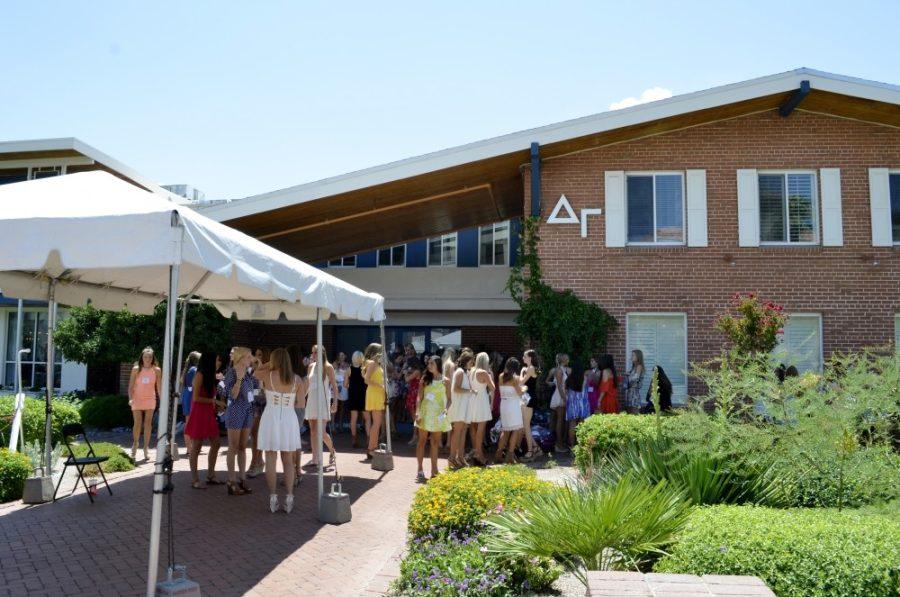Each year, thousands of UA students participate in Spring Rush to join a fraternity in the Interfraternity Conference or National Panhellenic Conference sorority. With over 10 percent of the UA student body participating in Greek Life, this community has a strong presence on campus. However, this community seems to lack involvement from LGBTQ students.
Jacob Winkelman, the co-director of the ASUA Pride Alliance, rushed during the fall of his freshman year with a close friend. Winkelman openly identifies as gay, but during the rush process, he tried his best to conceal that part of his identity.
“I started coming out the summer before college started, hadn’t told that many people and definitely wasn’t going to tell people during rush,” Winkelman said. “I was worried it would affect my chances of getting a bid.”
UA Greek rush uses a mutual selection process where no one is guaranteed a bid and voting is done in private. Winkelman feared that if fraternity members discovered he was gay, he may be voted out of bids behind closed doors.
Winkelman received a bid and remained in Sigma Alpha Mu for three years. Near the end of his pledge process, Winkelman began to come out to some of his brothers and word circulated quickly.
RELATED: Campus LGBTQ center needs more space, resources
“I had a pretty good experience,” Winkelman said. “People did not really care, like I didn’t get dropped or anything like that.”
Winkelman was not the only openly gay brother in his fraternity, and his brothers had varying levels of comfort with the subject. After coming out, the topic was rarely mentioned.
“It just wasn’t something we talk about ever,” Winkelman said. “It wasn’t really brought up. If you don’t talk about it you aren’t forcing them to face their discomfort.”
Winkelman describes his experience in Greek Life as positive. While his isolated experience was positive, he recognizes that heteronormative practices within Greek Life and the initial rush process may be deterring larger representation of the LGBTQ community.
“I think partially it is just having that visibility,” Winkelman said. “If people were gay, and heard there was an out person in the chapter, that is automatically going to make them feel better.”
Winkelman also suggested reforms in rush conduct. Specifically, carefully chosen, inclusive word choice may open up the Greek community.
“During conversations, try to not use heteronormative language,” Winkelman said. Say ‘Brothers can bring dates’ rather than saying ‘Brothers can bring girls’ to every rushing person assuming their sexuality.”
Alpha Chi Omega, a sorority represented on the UA campus, released a statement on Feb. 17 regarding a readiness to accept transgender women into their sisterhood.
“Alpha Chi must be inclusive of all who live and identify as women regardless of their gender assigned at birth,” said Angela Costley Harris, the national president of Alpha Chi Omega.
The UA Pride Alliance urges members of Greek Life to pressure their own chapters to release similar statements on inclusion.
RELATED: Total Frat Move reports false controversy between WRC, AEPi
Many other LGBTQ support groups on campus have addressed that their efforts are not related to inclusion within Greek Life.
Safe Zone is a campus-wide program aimed at making the UA safer for members of the LGBTQ community. The LGBTQ Affairs center at the UA offers this training to sororities and fraternities by request and will make it available online next year. Last year, Panhellenic required recruitment counselors to participate in Safe Zone training before the recruitment process began.
UA Greek Life also trains health advocates, a representative of the sorority or fraternity trained to promote healthy choices, inclusion and positive self-image throughout their organizations.
“One particularly noteworthy achievement was that 40 percent of the health advocates attended Safe Zone training and are now safe zone trained,” the Fraternity and Sorority Programs annual report stated.
Described as a major accomplishment, Safe Zone training is becoming more prevalent within the leaders of the greek community, yet 60 percent of health advocates were untrained on LGBTQ issues this spring.
Dominique Hinnen, a member of Chi Omega and club called Advocates Come Together, rushed last semester. Originally skeptical of Greek Life, Hinnen has found Greek Life to be a supportive environment and observed a general readiness to increase diversity among her peers.
“I was actually hesitant in the beginning during recruitment because I wasn’t sure how accepting Greek Life would be,” Hinnen said. “Once I started talking to girls I realized how genuine, diverse and accepting Greek Life can be.”
Follow Kelly Dorney on Twitter.









